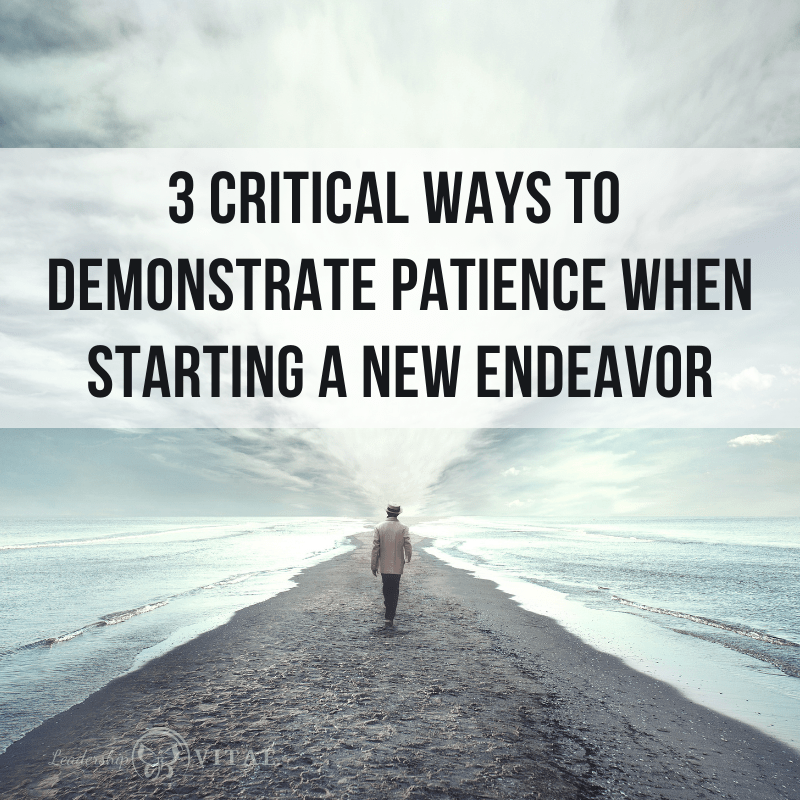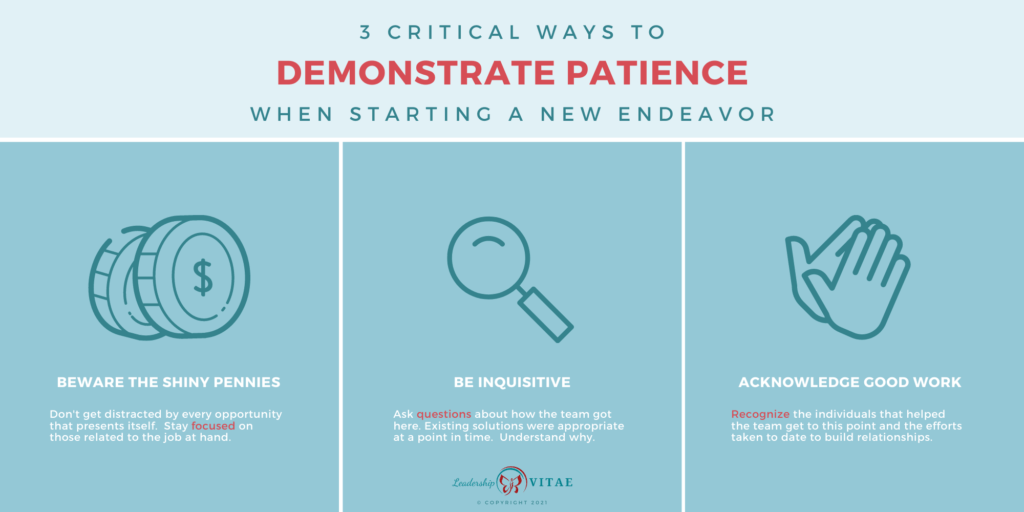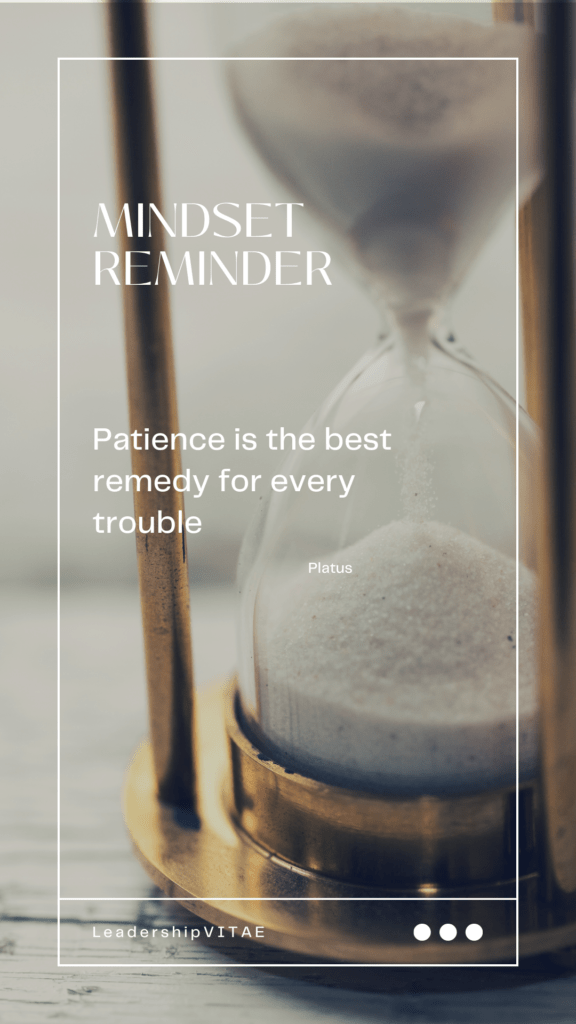
New jobs can be enticing. The early honeymoon period. Opportunities in abundance. Endless new people to meet and things to learn.
It can be mental and sensory overload. There’s a reason for the expression “drinking through the firehose.”
When I look back on my last few new jobs, they all shared the feeling of welcoming and belonging. The buzz of new challenge and digging into learning.
What they didn’t share is the how I was received after those first few weeks as a newbie. In prior roles, I’d get awesome feedback about my team, and something vague about partners. Over time, it would resolve, and I could never put my finger on what caused it.
In my latest role, my new manager was also relatively new to the company. He took the time to walk me through his experience and cautioned patience.
Patience has been the focus of my personal development for years. As a problem solver and life-long learner? I was chomping at the bit to dig in, meet the team, learn my customers, and get going.
Stepping back and considering his words, and being mindful in the weeks that followed, I could see the different patience made in my interactions with others. In the outcomes of the team. And in the feedback I received in those first few months, which was very different than those prior roles.
Reflecting back on those early conversations, there were three areas of focus. Each one of them a different way to pause and be patient before diving in to solve.

1. Be wary of the shiny pennies
We all bring gifts to a new job. Our unique mix of skill, knowledge, experience. Cultural lens, interpersonal skills, and more.
Imagine a set of glasses that can tune into a particular frequency of color. What we see, and how we see it, is colored by those glasses.
When we start a new role, certain things will stand out. They will flash like shiny pennies and catch our eye. Processes that can be improved, are missing and could be built, or are broken and should be fixed. Unhappy customers. Poor design or slow performance of systems.
Because we are new, we are likely to see the shiny pennies everywhere. Most of us also want to demonstrate value early, proving to a manager that they made a good hire. It will be tempting to go after those shiny pennies as easy wins.
It pays to resist the urge to pick up every penny we see. Give some time to know the role, and the organization, before jumping into to pick them up. First, there will always be more of them and we can’t fix everything. Second, we risk getting distracted by the pennies at the expense of the work we were hired to do.
Patience means pausing to ensure we’re picking up the right pennies at the right time. They’ll likely still be there when we’re ready. If not, maybe they didn’t need fixing.
2. Be inquisitive of existing solutions
Those shiny pennies? There’s a reason why they are there. While we see the world through one set of glasses, those around us are all tuning into different colored frequencies. It’s not that they don’t see the pennies. They don’t see them the same way.
Because others have been in the organization for a while, they likely understand why that particular process was built that way. Maybe there’s something regulatory that dictates it. Rather than assume something is broken or could be better – 90%+ of all processes are non-value add, so we’re not seeing things – we can ask how it works and why.
Being inquisitive first allows the space to understand what came before. It might be tempting to jump in and solve. To share prior experience in other roles that can be applied to make things better. Maybe they can, but first it’s important to know why something is the way it is.
Without that context and understanding, a perceived solution may cause more harm than good. It also marginalizes the work that’s been done so far and the people involved.
Maybe there were funding limitations or time constraint that demanded a particular solution short-term. Even if we are brought in to solve a particular issue, knowing more about it and what influenced the current state, can go a long way. In ensuring sufficient information is known before jumping in and building relationship equity with those who built or support it.
3. Acknowledge current expertise and efforts to date
If every opportunity we see is that way for a reason, that means there are good people that helped get it there. While we may think it can be better, and maybe were even hired to make it so, that does not diminish the hard work of those that came before.
While we come in with our particular blend of knowledge and experience, so does everyone else we meet. Our “shiny penny” that we see as an opportunity to improve is the product of someone else’s labor. Maybe many someone’s.
And they need to know we know that. While it may be tempting to dig in and start solving, pause. First acknowledge the efforts that have been done to date. They made sense at a point in time and worked for their purpose.
By acknowledging those involved in the history, they can be part of the future. Recognizing good work builds relationship equity. Whenever it is time to affect changes or replace a process or system, those same people may be needed. What they know, what they did, and why.
Building early relationships, based on respecting their contributions, can go a long way. Without that, it might fuel resentment for the newbie that has to be overcome later.
Patience is the best remedy for every trouble

A new job can be exciting, and it’s tempting to jump right in. We want to contribute and do well. And we will. Eventually.
I was meeting with a mentee recently and she was lamenting that she wasn’t contributing yet and worried about what that would signal to her leader. We talked about her on-boarding plan and what her leader was telling her.
Patience.
The leader was trying to ensure she had a solid foundation for success. Stepping her up to the full contribution she would be able to make within a matter of weeks.
I could relate, as the idea of weeks to start making a meaningful contribution felt like dog years. Yet what are a few weeks, or even 90 days, when a company hopes to keep you for years?
I’ve already seen the difference patience has paid in my new role. While it’s been uncomfortable at times, understanding the value has helped reign in my enthusiasm. And made a difference in my early relationships as well.
Those first 90 days are critical to how we will be received, and the trajectory of those years ahead. If we have patience, we can build solid footing. Understanding the challenges and opportunities around us, how they got there, and who helped build what exists today and why.
Then, we are in a better position to affect change and contribute from a place of knowledge and relationship equity. With patience and purpose.
In what ways have you practiced patience in a new role or company? Have you found it to make a difference in your relationships or effectiveness? Please share your thoughts in the comments below.








